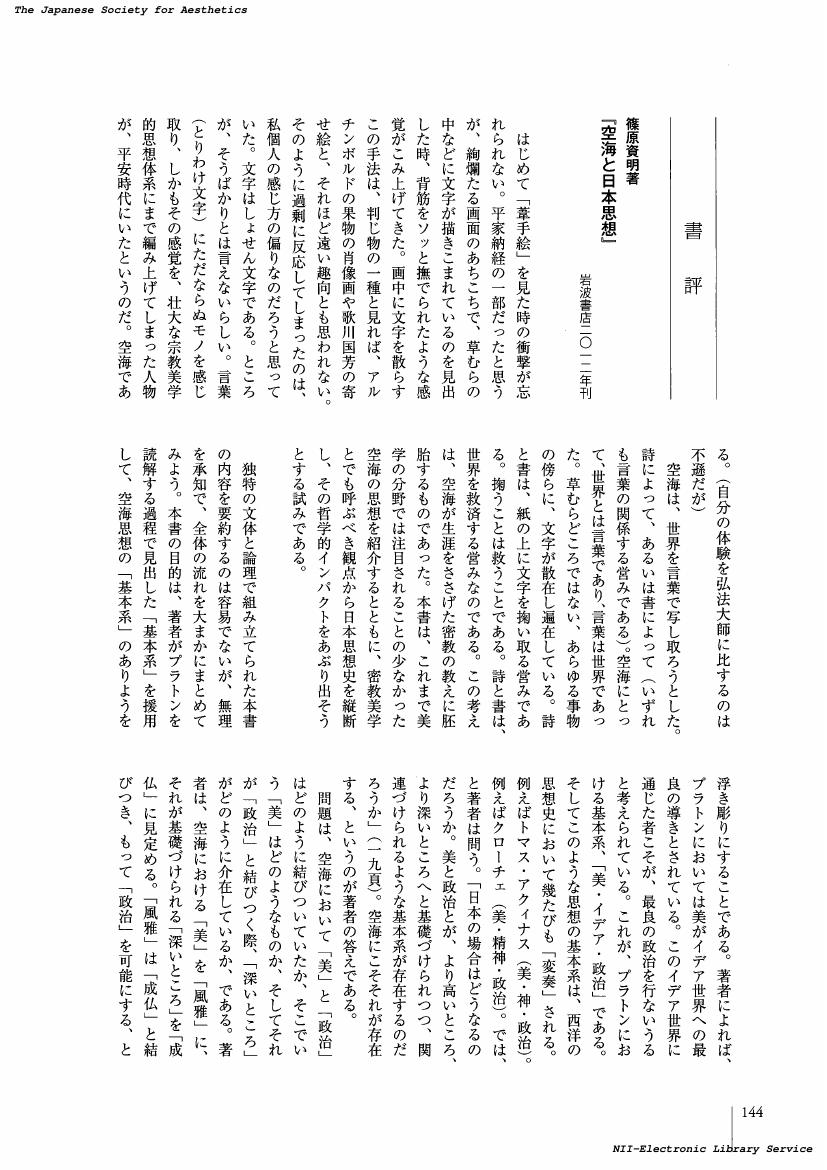3 0 0 0 OA 世阿弥の能楽論における「無」の源泉 : 音曲論の果たした役割をめぐって
- 著者
- 玉村 恭
- 出版者
- 美学会
- 雑誌
- 美学 (ISSN:05200962)
- 巻号頁・発行日
- vol.56, no.1, pp.69-81, 2005-06-30 (Released:2017-05-22)
Mu(nothingness, non-being) is one of the most important topics of Zeami's theory of Noh. It means a kind of excellence whose characters are; it has no tangible charm that makes deep impression; it cannot be performed intentionally; and it is attained only by a prominent actor after lifelong learning. It has been supposed that the Buddhist thought, especially Zen, had a great impact upon Zeami's raw. Yet how Zeami's own way of thinking and its metamorphosis influenced the generation of the idea of mu is still to be investigated. When Zeami contrived the new style of acting, senu-hima (no-acting), he might have found a clue to thinking out mu. However, that style lacks the important element of raw; it does not transcend the dualistic relationship between raw and yu(being). In this regard, Zeami's musical theory is worth consideration. According to Zeami, a prominent actor can sing a sound which cannot be determined whether it belongs to umon(artfulness) or to mumon(non-artfulness). This non-dualistic character of Zeami's musical theory can be seen as a origin of his idea of raw.
3 0 0 0 OA 人はなぜ謡の稽古に熱中するのか―夏目漱石と能 再考~稽古の現象学Ⅳ―
- 著者
- 玉村 恭 Kyo TAMAMURA
- 雑誌
- 上越教育大学研究紀要 = Bulletin of Joetsu University of Education (ISSN:24359629)
- 巻号頁・発行日
- vol.40, no.2, pp.687-703, 2021-03-31
2 0 0 0 IR 天・地・人をつなぐもの--世阿弥「一調・二機・三声」をめぐって
- 著者
- 玉村 恭
- 出版者
- 東京大学大学院人文社会系研究科・文学部美学芸術学研究室
- 雑誌
- 美学芸術学研究 (ISSN:13426095)
- 巻号頁・発行日
- no.25, pp.35-60, 2006
1 0 0 0 OA まとまりすぎてはいけない 世阿弥〈序破急〉論と〈成就〉の美学
- 著者
- 玉村 恭
- 出版者
- 美学会
- 雑誌
- 美学 (ISSN:05200962)
- 巻号頁・発行日
- vol.70, no.2, pp.152, 2019 (Released:2021-05-08)
1 0 0 0 IR 人はなぜ謡の稽古に熱中するのか―夏目漱石と能 再考~稽古の現象学Ⅳ―
- 著者
- 玉村 恭 Kyo TAMAMURA
- 雑誌
- 上越教育大学研究紀要 = Bulletin of Joetsu University of Education (ISSN:24359629)
- 巻号頁・発行日
- vol.40, no.2, pp.687-703, 2021-03-31
1 0 0 0 IR 《旅立ちの日に》は名曲か?
- 著者
- 玉村 恭 長 環 Kyo Tamamura Tamaki Cho
- 出版者
- 上越教育大学
- 雑誌
- 上越教育大学研究紀要 = Bulletin of Joetsu University of Education (ISSN:09158162)
- 巻号頁・発行日
- vol.38, no.1, pp.179-194, 2018
1 0 0 0 OA 篠原資明著, 『空海と日本思想』, 岩波書店, 二〇一二年刊
- 著者
- 玉村 恭
- 出版者
- 美学会
- 雑誌
- 美学 (ISSN:05200962)
- 巻号頁・発行日
- vol.64, no.2, pp.144-147, 2013-12-31 (Released:2017-05-22)
1 0 0 0 OA 遁世と詩歌 : 鴨長明『方丈記』『発心集』の遁世観と詩歌観
- 著者
- 玉村 恭
- 出版者
- 美学会
- 雑誌
- 美学 (ISSN:05200962)
- 巻号頁・発行日
- vol.58, no.2, pp.15-28, 2007-09-30 (Released:2017-05-22)
Kamo no Chomei is well known as a Japanese medieval recluse. This paper is aimed at reading his essays "Hojoki" and "Hosshinshu", and tries to rethink the relation between his reclusive life and poetry. The concept of reclusion for him was not necessarily related to how far he was removed from the capital nor what he did in his hermitage. Rather, the question was his state of mind, the extent to which his mind was detached from the usual worldly context and interest (kyokai or kyogai) such as social, political, and economical, of which people's circumstances consist and by which their daily cognitions are led. On the other hand, according to his notion of transience (mujo), nothing is certain other than the fact that people sense and feel various things and move their hearts variously. Thus, what was crucial in his reclusive life was how he could deal with his mind and heart. In those respects, poetry was for him one of the most important elements on which to base his reclusive life, because poetry, it has been admitted, does not have any worldly purpose nor interest at all; it is barely to express how people's hearts are moved.
1 0 0 0 OA 鴨長明における歌道(第五十七回美学会全国大会発表要旨)
- 著者
- 玉村 恭
- 出版者
- 美学会
- 雑誌
- 美学 (ISSN:05200962)
- 巻号頁・発行日
- vol.57, no.3, pp.75, 2006-12-31 (Released:2017-05-22)
- 著者
- 玉村 恭
- 出版者
- 美学会
- 雑誌
- 美学 (ISSN:05200962)
- 巻号頁・発行日
- vol.55, no.3, pp.64, 2004-12-31 (Released:2017-05-22)
1 0 0 0 OA 多様な音楽における認識法の違いをどう伝えるか
1 0 0 0 OA 天・地・人をつなぐもの : 世阿弥「一調・二機・三声」をめぐって
- 著者
- 玉村 恭
- 出版者
- 東京大学大学院人文社会系研究科・文学部美学芸術学研究室
- 雑誌
- 美学藝術学研究 (ISSN:13426095)
- 巻号頁・発行日
- vol.25, pp.35-60, 2007-03-29




